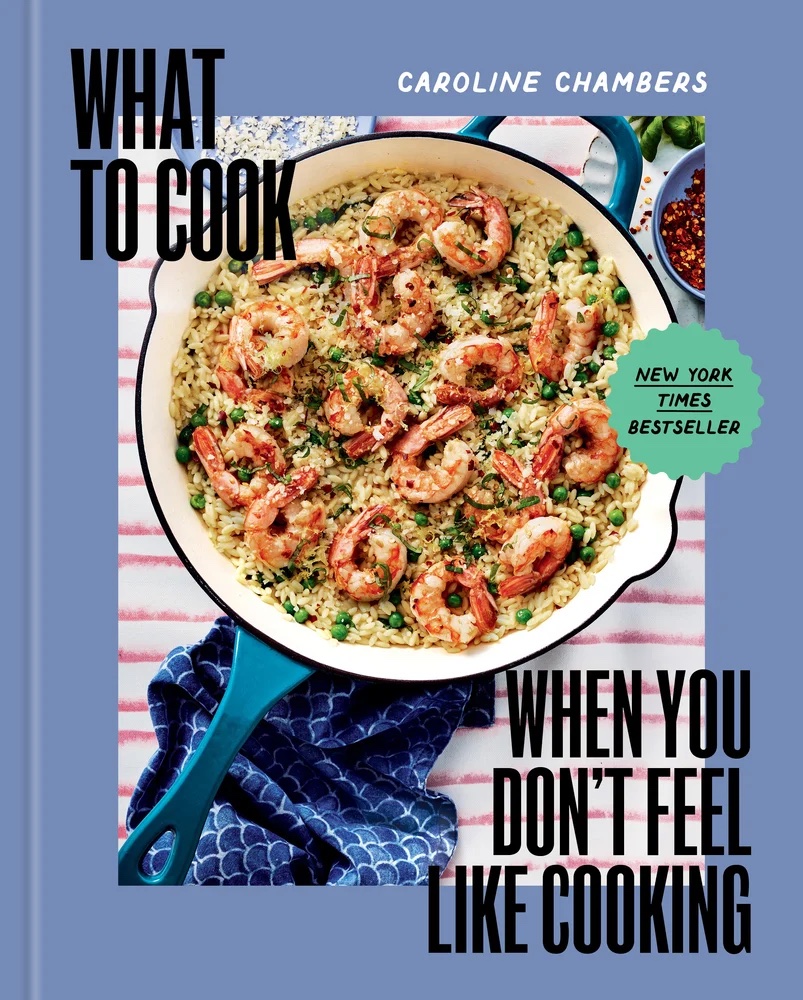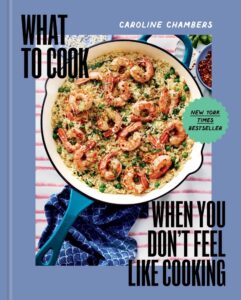You don’t have to tell Caroline Chambers that cooking can be a chore. Whether she was serving clients at her early-career catering company or pleasing picky kids at home, the Winston-Salem native learned through experience that not every mealtime merits loads of dishes, multiple grocery store runs, or hours of prep. Now, her bestselling cookbook and weekly newsletter, both titled What to Cook When You Don’t Feel Like Cooking, embrace that reality without sacrificing flavor or fun.

“Cooking doesn’t have to be that serious,” she says. Her mother, a Tennessee native who worked full time and lightened up classic Southern recipes to accommodate her Type 1 diabetes diagnosis, gave Chambers an early education in healthy-ish, time-conscious meals. “Cooking family dinner and eating together was really important to her,” Chambers explains. That meant everyone pitched in. “It was in the chore rotation: Get dinner started.”

Chambers, who now lives in Carmel Valley, California, honors those roots by creating delicious, inherently cookable recipes that fit into busy lives. Not only are many of them low-prep and quick-cooking, but they often come with a laundry list of optional substitutions; dairy-free, gluten-free, kid-friendly, and vegetarian riffs abound, and she’s almost always got you covered with a swap if you forgot an ingredient at the store.
“Everyone follows recipes so strictly, like if you’re missing one spice you have to run to the grocery store. It makes it such a pain! None of that is necessary,” she says.
So who better to share tips for the joy-filled, mayhem-studded holiday season? G&G spoke with Chambers about the everyday cooking and hosting principles she follows that might be helpful for the chronically overwhelmed.
Long live the welcome drink.
“Southern hospitality really is a different breed,” Chambers says. “What I’ve realized is really a Southern thing is making sure your guests have a drink the second they walk through the door.” It’s a ritual she saw her parents act out over Christmas parties and supper clubs, and not necessarily one that centers around plying guests with alcohol. “It’s, ‘Here’s the house, here’s the lay of the land,’” she says. It’s walking your guests inside and setting them up to feel at home. “And there’s a passing off of that guest: ‘Oh, here’s my friend Sally that you don’t know,’ or, ‘Here, you guys are both parents at this school.’”
Covering the actual drinks is the easy part, whether you’re stocking up on wines and spirits or mixing up Chambers’s signature “jar-garita” (a cocktail that uses up a last little bit of jam or jelly, with the empty jar as a vessel).
Great conversation can be a recipe, too.
“So often at a dinner party of ten people, you end up breaking off into little two- or three-person conversations, and to me that’s a bummer,” she says. “I love what my friends call ‘table talk’: one question that everybody goes around and answers.” Her go-to: If there was an apocalypse tomorrow and we were all stranded in this house for the next two years, what would you bring to the community? What’s your skill? “It’s a really fun way to share who you are with a big group—or brag on your partner.”
Your freezer is your friend.
Hosting a meal can be a challenge. Hosting guests for several days, a gauntlet. In both cases, frozen and pre-made meals are a gift to yourself and your guests.
“Even when I host girlfriends for dinner or lunch, I love making a soup that can be cooked months ahead of time,” Chambers says. “This Christmas we’re hosting my whole family here for the first time in seven years. In the month before the holiday craziness starts, I’ll make a chili, I’ll make a soup. I will absolutely make a full menu for the whole week.”
In What to Cook, Chambers shares recipes for pasta sauces, chilis, and plenty of other great freezer fodder. But she also applies a make-ahead mindset to dessert. Take her peanut butter pots de crème. Developed during her catering days when she needed to minimize dirty pots and maximize chic presentation, the recipe relies only on a blender and a fridge. “It’s so rich,” she says. “I used to serve it in a little shot glass with little miniature spoons.” For the holidays she riffs by omitting the peanut butter, adding peppermint extract, and topping each serving with crushed candy canes.
Perfection is overrated.
Whether you’re juggling kids’ activities or navigating a busy time at work, entertaining often means letting go of the idea that everything has to be flawless. “We’re not in a true dinner party phase of life,” Chambers says. “But we are in a ‘let’s-cram-our-families-into-one-house-and-do-dinner-together-tomorrow’ phase.”
Fancy dishes aren’t what make the memories, she says; paper plates are fine. And really, no one is surprised to see a home that looks like someone actually lives there. “People put way too much pressure on making their houses look perfect,” she says. “It’s okay for your kitchen to look like you’ve been cooking in it. You have!”
But little touches go a long way.
Chambers likes to keep fresh herbs on hand to dress up simple dishes. And when the going gets tough, don’t knock store-bought. “If you don’t love cooking, hosting a party where you cook a lot of food is just a terrible idea,” she says. “Just be gracious and put it on a pretty platter. You don’t have to cook a single thing if you don’t want to and people will still have a great time.”
Great hospitality goes the distance.
Chambers doesn’t hesitate when asked what she misses most about the South. “My family,” she says. “When there’s something hard, you want your family there. When there’s something fun, you want your family there.”
But hospitality over the holidays—or any time—isn’t just about having people over. Chambers spends a little extra money to have everyone’s gifts shipped to her before she ships them, so she can wrap them and write a personal note. “The act of gift giving is so much about sharing the context—‘I was in this store in Cape Cod, I saw it, and I thought of you,’” she says.
On a local level, dropping a meal on the doorstep can be a godsend for busy or housebound loved ones. In What To Cook, Chambers shares a curated list of homemade ideas for that scenario, like pesto meatballs or summer soup. But she’s also quick to extol the virtues of a store-bought spread. In fact, perhaps one of Chambers’s party-hosting mantras is just as applicable in this sense, too. “Nobody cares what they’re eating,” she quips, “as long as they didn’t have to cook it themselves.”
Garden & Gun has an affiliate partnership with bookshop.org and may receive a portion of sales when a reader clicks to buy a book.










